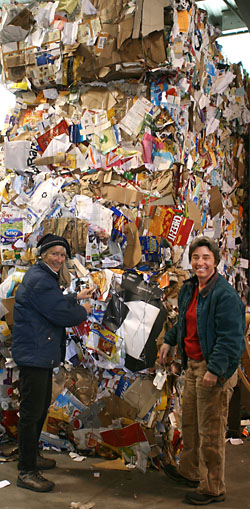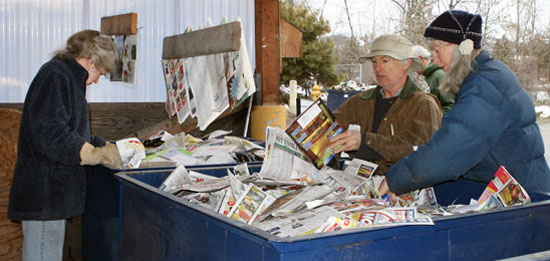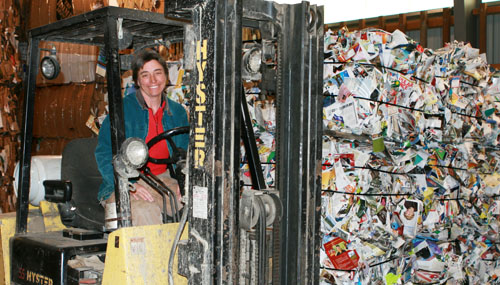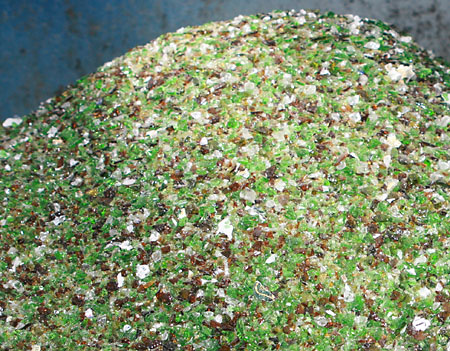|
 Aluminum is one of the more profitable items to recycle. Aluminum is one of the more profitable items to recycle.
Talking Trash
Methow Recycles hits 10 years
story and photos by Solveig Torvik
 The bale of recycling behind plant manager Susan Ernsdorff, left, and executive director Betsy Cushman will sell for $50 to $60.
It’s been ten years this month since Methow Recycles started diverting the valley’s waste stream away from the county landfill and converting trash into salable, reusable materials. So far, 6,800 tons of waste has been reclaimed by the non-profit organization, and it’s now chugging along at roughly 650 tons a year, says executive director Betsy Cushman.
“I’m always amazed by how much effort people are willing to put into it,” Cushman says of the valley’s recycling effort. Unlike in a city such as Seattle, recycling here is voluntary and time-consuming.
“It’s basically a hand-made product,” Cushman says. Aluminum cans, tin cans, newspapers, glossy paper and magazines, office paper, cardboard, glass, blue glass and various grades of plastic all must be sorted by type and tossed into separate bins by “customers” using the Twisp service. As a result of all this hand-crafting of unwanted trash, she says, Methow Recycles waste is sought after by buyers such as Keyes Fibre in Wenatchee or Spokane Recycling, a subsidiary of Waste Management Inc., because it’s known to be a high quality product.
Methow Recycles has an operating budget of $130,000 a year. “It’s tight,” says Cushman. Despite wildly varying prices for its product over the years, the organization has managed to avoid running in the red, she says. This year, profit from sales is paying 70 percent of the organization’s expenses, but some years it’s been as high as 90 percent and other times as low as 40 percent. Shortfalls have been made up by donations.
About 80 percent of the revenue comes from aluminum, cardboard, magazines and newspaper, says Cushman. Glass is a big loser for the organization. It costs 20 percent more to turn glass into sand than to ship it to the landfill, she says. “It’s the one thing that we’re not actually recycling,” she adds, and none of it leaves the valley. The glass-crunching machine is a source of endless breakdowns and repairs. “Glass has never paid for itself.” That’s why glass trash donors are asked to drop money into the little box by the glass bins to help defray the cost of handling it.
The organization functions with only five paid employees, all of them part-time, including plant manager Susan Ernsdorff, who has a master’s degree in chemical engineering and experience as plant manager for Essential Baking in Seattle. Yet it’s largely the dedication of 46 hardy volunteers that makes it possible to make ends meet financially.
“We need more people to volunteer,” stresses Cushman. “We are not fat on volunteers. It’s the most vulnerable part of our business model,” she says, and the volunteers she has are aging. Two are over 80, several more are close to 80, and one-third are over 60 years of age. “We need those young retirees to step up.”
 Jane McLaughlin, left, Brad Campbell and Susan Ernsdorff on quality control duty at the bins. Jane McLaughlin, left, Brad Campbell and Susan Ernsdorff on quality control duty at the bins.
There had been other efforts to recycle in the valley before Methow Recycles, but none of them lasted. Cushman says she believes her organization has been successful because it was the first to understand what the industry wanted to buy. For this she credits Don Davidson, owner of Methow Sanitiation Services and a board member of Methow Recycles who had experience in the Seattle waste industry. He helped the organization understand the needs of the market.
“We need a buyer more than they need us,” Cushman explains. “We’re tiny. If they lost us, it wouldn’t matter to them.” So Methow Recycles pays close attention to the quality of the product it offers for sale.
Methow Recyles has never been in the waste pickup business. But Recycle Roundup, a private company owned by Casey Bouchard and Joseph Weaver, hauls recyclables to the center and offers residential pickup.
 Betsy Cushman manages the waste stream cycle from her favorite perch on the forklift at Methow Recycles.
The genesis of Methow Recycles was a conservation study spearheaded by Gina Monteverde and Ellen Lamiman at the Okanogan County Electric Cooperative, according to Cushman. With a Forest Service grant administered by Leahe Swayze, Monteverde and Davidson - who later talked Cushman into taking the job - traveled to other rural areas that had recycling programs to learn what would be needed to make it work here. They concluded that “if we could open without debt and rely heavily on volunteer labor and produce a high quality product, then we had a chance to support ourselves,” says Cushman.
So far, that formula has worked.
The Methow Conservancy, town of Twisp and the co-op all were involved in the recycling start-up effort, says Cushman, and the facility sits on land leased from the county. The fledgling recycling organization got a grant from the Washington State Department of Ecology to construct the present building, although the money was given to the county to administer. However, the grant didn’t require that the county operate the facility. But terms of the grant do require that if the building is not used for recycling, the money has to be paid back at current market value of the building, she adds.
For the first few months until Methow Recycles became an independent non-profit, the Methow Conservancy was its fiscal sponsor, assuming its legal liabilities. Yet the books and bills were handled by the co-op. “It was the period of trust and cooperation that you don’t see that often,” she recalls. Cushman says she sees this unorthodox cooperation as evidence of how much residents of the valley wanted a recycling facility. Six hundred individual donors gave money to help it get up and running.
 After blue glass is separated out jars and bottles are crushed into these small bits to be re-used in the valley. Glass is the one thing not actually recycled because it doesn't pay.
Methow Recycles remains without debt. “We own very little. We own equipment. We don’t own land,” Cushman says. It has $40,000 in savings for equipment expenses and $29,000 is put aside for a three-month contingency operating fund. The only building Methow Recycles owns is the old farm shed donated by Moccasin Lake Ranch to house the troublesome glass crusher.
The next decade for Methow Recycles is starting with plans for expansion. Safety and capacity issues helped drive the decision to ask the town of Twisp for permission to lease about an acre of land adjoining the recycling facility. Kids, old people, cars, and forklifts are a worrisome mix, says Cushman, who adds that she only hires people “with eyes in the back of their heads” who are capable of constantly monitoring the traffic into the facility. For safety reasons, that traffic needs to be re-routed to a new building that would also expand capacity, she explains. “We’re maxed out.” The project is expected to cost between $200,000 and $300,000.
Methow Recycles also has changed its mission statement from the simple “Make recycling easy so everyone can do it,” to be more expansive, says Cushman. The focus has broadened to include making sure that Methow Recycles not only remains financially stable but that it increases materials collection and expands opportunities for material re-use as well as for waste stream reduction.
Cushman, 53, a Wisconsin native and former private sector manager of computer systems for retail and manufacturing firms in Seattle, was hired on a temporary, six-month basis in October of 2001. It was a job that was to be hers only until someone else could be found, as she tells it.
Ten years later, the temporary hire is still running the place. “It was more fun than I imagined,” Cushman grins.
4/10/2012
|
